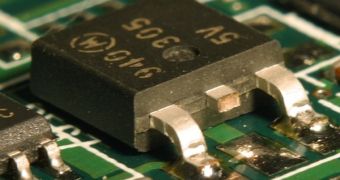Chip manufacturer Intel has just revealed further details about its upcoming generations of computer processors, that are alleged to be immune to the side effects caused by cosmic rays. Although they do not affect the life on Earth, cosmic rays have the habit of causing havoc amongst electronic systems, as they go through their components.
Computers are mostly affected by the tiny cosmic rays, as silicon chips are working using charged particles. When a cosmic ray hits the chip, they block the computers' normal activity, and even cause systems to crash.
"What happens is if a cosmic ray causes a collision inside the silicon chip, that releases lots of charged particles," Intel's senior scientist Eric Hannah claimed in an interview. "All our logic is based on charge, so it gets interference."
At the moment, cosmic rays are not much of a threat for computers using a single processor, as the impact probability is almost negligible. However things get another turn when it comes to a supercomputer running on ten thousand chips. According to Hannah, the combination of cosmic rays and supercomputers can lead to between 10 and 20 faults a week.
More than that, as the silicon chips get smaller and smaller, the cosmic particles' charge will cause more and more damage, as they will require less electrical charge per transistor switch.
Computers are not the only "intelligent" devices to suffer from the impact of cosmic rays. Almost any chip-driven application will witness the same loss of functionality, including mobile phones and even cars.
"You could be going down the autobahn at 200 miles an hour and suddenly discover your anti-lock braking system doesn't work because it had a cosmic ray event," Hannah said. "It's strange, but this is the reality we're moving into as we get smaller and smaller circuits."
Intel's tiny cosmic ray detector can be integrated into the chip in order to spot the interferences and instruct the processor to repeat the previous command. "Everyone else was trying to do it with circuit resistance and more robust designs, or looking at the architecture," continued Hannah.
However, Intel's cosmic ray detector is still a project, and it will be a long way until it gets fully operational.

 14 DAY TRIAL //
14 DAY TRIAL //